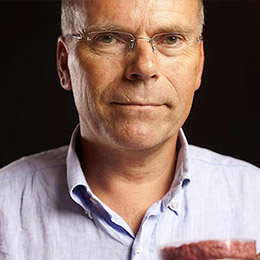
World Technology Award for Environment Winner, Professor Post is most known for the development of the world’s first hamburger from cultured beef, which was presented in London in August 2013. Professor Post, the Head of the Cultured Beef program at Maastricht University, is a medical doctor who has had several appointments at Harvard University, Utrecht University, Dartmouth College, and Eindhoven University of Technology. He currently holds the Chair of the Physiology Department at Maastricht University. His main research interest is the engineering of tissues for medical applications and for food.
Professor Post, a physician, considers himself a vascular biologist and a tissue engineer. Most of his time is dedicated to studying the growth of blood vessels and how to build blood vessels. His main research interest is the engineering of tissues for medical applications and for food. The medical applications focus on the construction of blood vessels that can be used as grafts for coronary artery bypass grafting. Tissue engineering for food has lead to the development of cultured beef from bovine skeletal muscle stem cells in an effort to supplement and perhaps transform the traditional meat production through livestock. Professor Post has co- authored 160+ papers in leading peer-reviewed scientific journals and has raised close to 50 million dollars in funding from various sources including Sergey Brin, co-founder of Google, government, charity and industry.
In 2008 Professor Post got involved in a Dutch program investigating in vitro meat. In August 2013 he presented the world’s first hamburger from cultured beef at an event in London. This work led to the receipt of the World Technology Award for Environment at the World Technology Award Gala in New York in November 2013.
